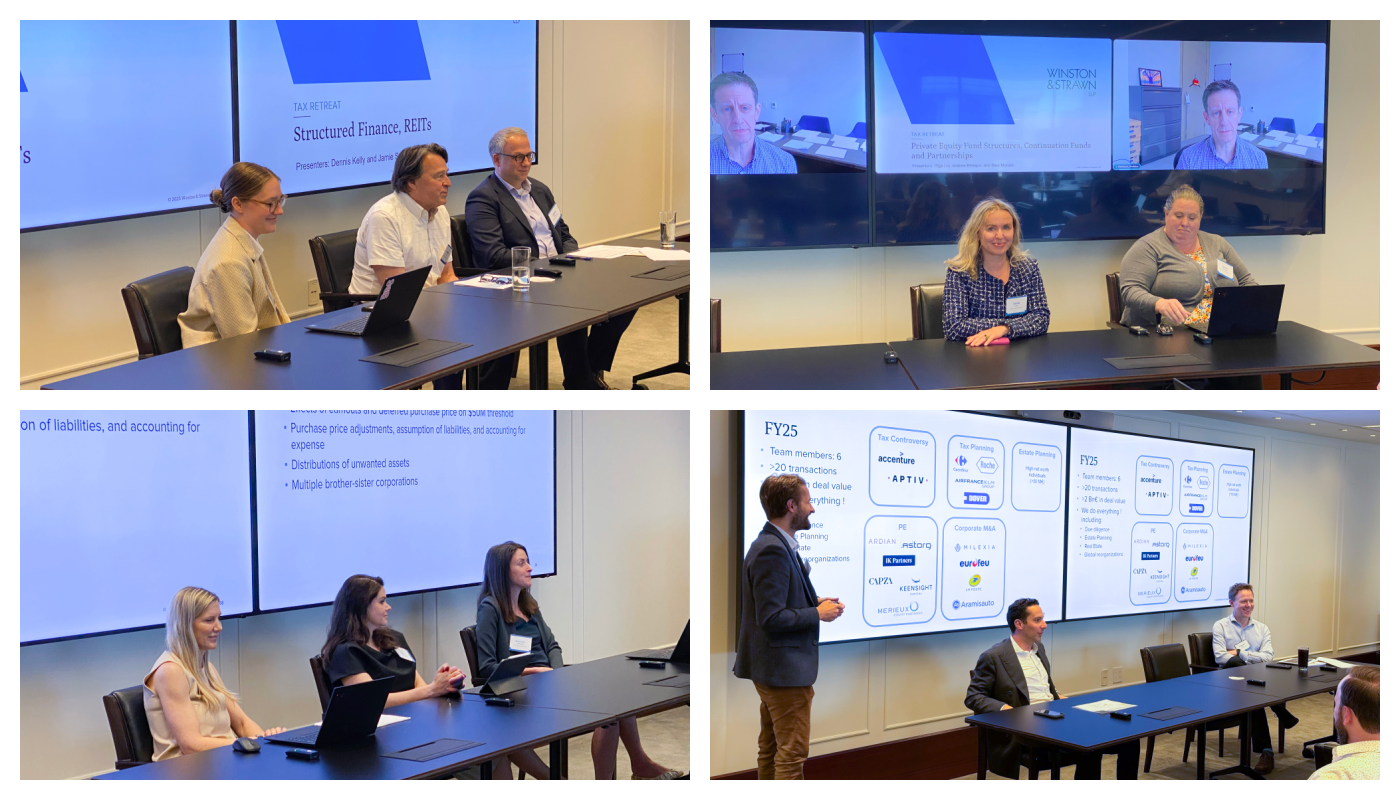Seminar/CLE
Winston & Strawn Hosts 2025 Tax Department Retreat
Seminar/CLE
June 11-13, 2025
Winston & Strawn’s Tax Practice recently hosted an internal department retreat in Chicago. This multi-day event brought together tax lawyers from across the firm’s offices to foster cross-office collaboration, discuss emerging market trends, and align on strategic priorities for the practice. The retreat provided an opportunity for lawyers to deepen relationships, share insights, and explore new ideas across key areas of tax law.
The retreat featured presentations and discussions led by Winston’s tax lawyers on various topics. In addition to programming, the retreat included several off-site events to encourage team building, including an opening reception, group dinner, and a Chicago architecture boat tour.
Key takeaways from the presentations
Tax Structuring of Private Equity, M&A and Capital Markets Transactions
Rachel Ingwer, Angela Russo, Katherine Erbeznik presented on the basics of tax structuring in M&A, private equity, and capital markets transactions. The presentation provided the Winston tax practice group with an overview the various steps involved in the acquisition of certain tax entities, including the acquisition of partnerships, S corporations, and blockers. The presenters also shared with the group popular topics and trends currently present in private equity, M&A and capital markets transactions, such as the relevance of qualified small business stock and de-SPACs.
Private Equity Fund Structures, Continuation Funds and Partnerships
Olga Loy, Andrew Betaque, and Sara Monzet spoke to the Winston tax team about a range of issues relevant to their practice providing tax assistance to funds and partnerships. The presentation included an overview of typical fund structures, the tax considerations of different investors of a fund based on an such investor's tax status, the importance of tax distributions in certain transactions, and the possible structures of a continuation fund.
Structured Finance, Real Estate Investment Trusts (REITs)
Dennis Kelly, Jamie Saeli, Scott Englert and Emily Waltz provided the Winston tax group with a presentation on the tax considerations involved in various structured finance, REMIC and REIT-related transactions. For example, the presenters laid out the analysis and nuances for determining whether collateral may be considered a real estate asset for tax purposes and whether debt secured by real estate may be a taxable mortgage pool. The presentation also consisted of recent case studies and hot topics that Winston tax lawyers had experienced in the world of asset backed securitizations.
European Tax Structuring Issues and OECD Pillar Two
Edouard De Racher and Thomas Pulcini, from Winston's Paris office, presented on tax structuring issues that appear in French private equity deals. In particular, the presenters shared the role of management packages (or ManPacks) and ratchet shares in such private equity transactions. Ed Denny, from Winston's London office, gave a presentation on UK's Qualifying Asset Holding Company regime (QAHC) and Pillar Two.
International Tax Structuring
Summer LePree and Jeff Rubinger discussed several topics relating to international tax structuring. For example, the presenters shared with the group the impact of GILTI inclusion rules and Section 962 elections on individual U.S. shareholders investing directly in a Controlled Foreign Corporation (CFC) and planning opportunities with the portfolio interest exemption.
Tax Litigation and Controversy Practice
Jim Mastracchio and Susan Seabrook provided the tax group with updates regarding the latest Winston & Strawn Tax Court triumphs. In particular, the Winston tax litigation and controversy team took part in the U.S. Tax Court's production of a Memorandum Opinion that expanded, for the first time, the Claim of Right Doctrine to include loan advances in the mortgage services industry. They also provided an overview of Winston’s work for the U.S. Virgin Islands tax system.
Energy Tax Credits
Louis Jenull spoke to the Winston tax group about his experience working on a range of deals pertaining to energy tax credits. He identified the key parties and issues involved in these transactions. Such deals, broadly speaking and with a range of variation, may involve an investor's contribution of equity that finances certain development projects and pays off any relevant loans, for which the investor will receive credits that ultimately can be sold to a buyer. Louis also explained how the burgeoning energy credit market could be impacted by the pending congressional tax legislation.



















